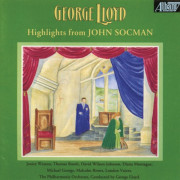Philharmonia Orchestra, conducted by George Lloyd
Janice Watson, Thomas Booth, David Wilson-Johnson,
Diana Montague, Michael George, Malcolm Rivers,
London Voices Chorus
In 1949 the Arts Council of Great Britain commissioned three new operas for the Festival of Britain, 1951 - Pilgrim's Progress by Vaughan Williams to be played at Covent Garden; Billy Budd for Sadlers Wells by Benjamin Britten; and John Socman by George Lloyd for the Carl Rosa Opera Company, to tour the country. Lloyd had recently returned from Switzerland where he had been living with his wife's family to recover from injuries he had received during World War II. Writing the opera had left him in an exhausted condition; he had been asked to conduct his work but felt he did not have the strength at that time. From then on there were serious production difficulties, but in spite of them, the opera toured the country for two years.
Reviews:
...A stirring and intensely dramatic opera, it has tremendous vitality. His work is grand, full of power and vision, culminating in a magnificent chorus. It deserves a permanent place in the repertory...the opera was given a most enthusiastic reception. The Stage
...Mr Lloyd has, to his abundant credit, attempted to achieve a happy medium between modern idioms and traditional tunefulness...to put it another way, he has tried to give us a really "singable" and therefore entertaining opera.
...The 79 minutes of music here demonstrates Lloyd's impressive operatic skills, .... particularly his strength in conveying meaning and character through the vocal line as well as through the orchestra. David Wilson-Johnson is excellent in the title role, gently pleading then becoming almost Scarpia-like in his malevolence. His long Act II duet with Janice Watson, a fine assertive Sybil, is an expressive tour de force. Thomas Booth's Richard is strong and confident. Lloyd as conductor secures colourful and committed contributions from all his singers and the Philharmonia is in good form. Performance : **** Sound : **** BBC Music Magazine
...As with Iernin , George Lloyd's other recently recorded opera (Albany, 9/94), the heart goes out to it: that is to say, mine does. John Socman was one of the three opera commissioned for the Festival of Britain in 1951 and, compared with the others (Billy Budd and The Pilgrim's Progress, which went straight to Covent Garden), it ranked at best as a fringe event. Its home was Bristol, its company the Carl Rosa. It was produced on a shoe-string, with an orchestra of about 35 players, under-rehearsed, renounced (as a production) by the composer, and was, apparently, a hotbed of acrimony.
Reviews, if sympathetic, condescendingly pointed out the sources of, or influences upon what was generally regarded as a derivative, unprogressive score. A second performance was given after the première, which was followed by a number of performances around the country, but little has been heard of John Socman since then. But it is well worth waiting for. Again, as with Iernin, the music blossoms, not just lyrically (that is said of innumerable tuneless scores) but melodically. At the centre of the music is the singing voice. Although the orchestral writing is full-bodied and thoroughly active, the heart of the matter nevertheless lies with the singer. The music is also good to sing - one feels that here is a composer who sings in his imagination as he writes. Certainly there are phrases that recall something else (a chord of Fanciulla, an impulse from the Nedda/Silvio duet in Pagliacci, a touch of the Shepherd Lel in The Snow Maiden); but essentially it comes from the man himself, the impulses are his.
Dramatically, it is harder to tell. The story, set in Wiltshire as the troops are returning from Agincourt, provides good operatic material. The libretto, by the composer's father, is singable, and the moments of confrontation, recognition and so forth seem to be times with fair theatrical instinct. The single disc gives only 'highlights', so that, in the absence of a score (which I did not succeed in procuring), and with one important scene (Act 2 scene 2) completely missing, judgement has to be suspended. What is here has been prepared with conviction and performed with worthy forces. David Wilson-Johnson in the title-role sings with fine resonance, doing his best to sound nasty when the need arises (but then we are led to believe that nastiness is not really in Socman's nature either). Thomas Booth is a useful hero-tenor, John Winfield (in the role originally taken by Tudor Davies) an effective character-tenor, a medieval friar with a little of Gershwin's Sportin' Life about him.
The composer himself conducts and, one hopes, with satisfaction on returning to his rejected opera after all these years. In 1951 they wrote his off as a reactionary; I prefer to think he was ahead of his time JBS Gramophone

